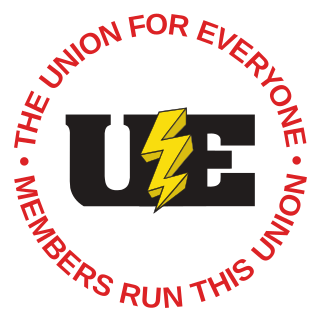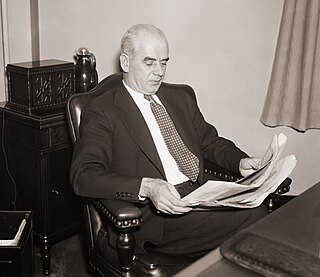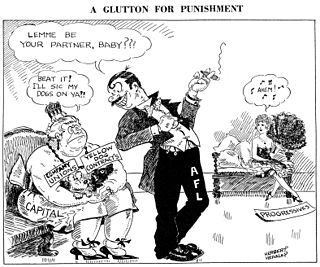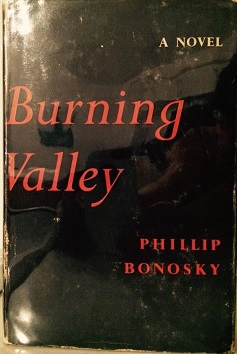
William Z. Foster was a radical American labor organizer and Communist politician, whose career included serving as General Secretary of the Communist Party USA from 1945 to 1957. He was previously a member of the Socialist Party of America and the Industrial Workers of the World, leading the drive to organize the packinghouse industry during World War I and the steel strike of 1919.

Philip Murray was a Scottish-born steelworker and an American labor leader. He was the first president of the Steel Workers Organizing Committee (SWOC), the first president of the United Steelworkers of America (USWA), and the longest-serving president of the Congress of Industrial Organizations (CIO).

The United Steel, Paper and Forestry, Rubber, Manufacturing, Energy, Allied Industrial and Service Workers International Union, commonly known as the United Steelworkers (USW), is a general trade union with members across North America. Headquartered in Pittsburgh, the United Steelworkers represents workers in Canada, the Caribbean, and the United States. The United Steelworkers represent workers in a diverse range of industries, including primary and fabricated metals, paper, chemicals, glass, rubber, heavy-duty conveyor belting, tires, transportation, utilities, container industries, pharmaceuticals, call centers, museums, and health care.

The United Electrical, Radio and Machine Workers of America (UE), is an independent democratic rank-and-file labor union representing workers in both the private and public sectors across the United States.

Operation Dixie was the name of the post-World War II campaign by the Congress of Industrial Organizations to unionize industry in the Southern United States, particularly the textile industry. Launched in the spring of 1946, the campaign ran in 12 Southern states and was undertaken as part of a dual effort to consolidate wage gains won by the trade union movement in the Northern United States by raising wage levels in the South while simultaneously transforming the conservative politics of the region, thereby allowing the trade union agenda to win on a national scale.
Tom Juravich is a professor of Labor Studies at the University of Massachusetts Amherst.
Kate Bronfenbrenner is the Director of Labor Education Research at the Cornell University School of Industrial and Labor Relations. She is a leading authority on successful strategies in labor union organizing, and on the effects of outsourcing and offshoring on workers and worker rights.

The Conference for Progressive Labor Action (CPLA) was a left-wing American political organization established in May 1929 by A. J. Muste, the director of Brookwood Labor College. The organization was established to promote industrial unionism and to work for reform of the American Federation of Labor. It dissolved itself in December 1933 to form the American Workers Party.

The Great Steel Strike of 1919 was an attempt by the American Federation of Labor to organize the leading company, United States Steel, in the American steel industry. The AFL formed a coalition of 24 unions, all of which had grown rapidly during World War I. In the lead role would be the Amalgamated Association of Iron, Steel and Tin Workers (AA) with a five-member steering committee. The strike began on September 22, 1919, and finally collapsed on January 8, 1920. The opposition led by Elbert H. Gary, president of U.S. Steel had triumphed.
A comprehensive campaign is labor union organizing or a collective bargaining campaign with a heavy focus on research, the use of community coalition-building, publicity and public pressure, political and regulatory pressure, and economic and legal pressure in addition to traditional organizing tactics.

Ruth Milkman is an American sociologist of labor and labor movements. She is Distinguished Professor of Sociology at the CUNY Graduate Center and the director of research at CUNY School of Labor and Urban Studies. Between 1988 and 2009 Milkman taught at the University of California, Los Angeles, where she directed the UCLA Institute for Research on Labor and Employment.
George Becker was a steelworker, American labor leader and president of the United Steelworkers (USW) from 1993 to 2001. During his tenure as president of the Steelworkers, Becker also served as a vice president of the AFL-CIO.

Leo W. Gerard is a retired steelworker and Canadian and American labour leader. He was elected president of the United Steelworkers (USW) in 2001, becoming the second Canadian to head the union. He served in the role until July 2019. He also served on the Executive Council of the AFL-CIO.
The AFL–CIO Organizing Institute is a unit within the Organizing and Field Services Department of the American Federation of Labor and Congress of Industrial Organizations. Founded in 1989, the OI serves as the primary training body for most organizers in the AFL–CIO and its member unions.
James Richard Hougan is an American author, investigative reporter and documentary film producer.
Salting is a labor union tactic involving the act of getting a job at a specific workplace with the intent of organizing a union. A person so employed is called a "salt".

Burning Valley is a 1953 coming-of-age novel by the American writer Phillip Bonosky set in the steel valley of Pittsburgh, Pennsylvania during the 1920s. It was originally published in the Communist Party publication Masses and Mainstream. In 1998 it was reprinted as part of the series "The Radical Novel Reconsidered" by the University of Illinois Press.
The Cannery and Agricultural Workers Industrial Union (CAWIU) was a Communist-aligned union active in California in the early 1930s. Organizers provided support to workers in California's fields and canning industry. The Cannery and Agricultural Workers Industrial Union (CAWIU) dated back to 1929 with the formation of the Trade Union Unity League (TUUL). With industrialization and the advent of the factories, labor started migrating into the urban space. An influx of immigrant workers contributed to the environment favorable to big business by increasing the supply of unskilled labor lost to the urban factories. The demand for labor spurred the growers to look to seasonal migrant workers as a viable labor source. Corporations began to look at profits and started to marginalize its workers by providing sub-par wages and working conditions to their seasonal workers. The formation of the Cannery and Agricultural Workers Industrial Union addressed and represented the civil rights of the migrant workers. Ultimately the CAWIU lost the battle, overwhelmed by the combined alliance of growers and the Mexican and state governments. The eventual abandonment of the Trade Union Unity League led to the dissolution of the CAWIU, which later emerged as the United Cannery, Agricultural, Packing, and Allied Workers of America (UCAPAWA).
The 2020 Alabama aluminum plant strike is a labor strike that occurred in Muscle Shoals, Alabama, United States from December 2020 to January 2021. The strike involved approximately 400 members of the United Steelworkers Local 200, over alleged unfair labor practices by Constellium, a multinational producer of aluminum products who operate a manufacturing plant.









